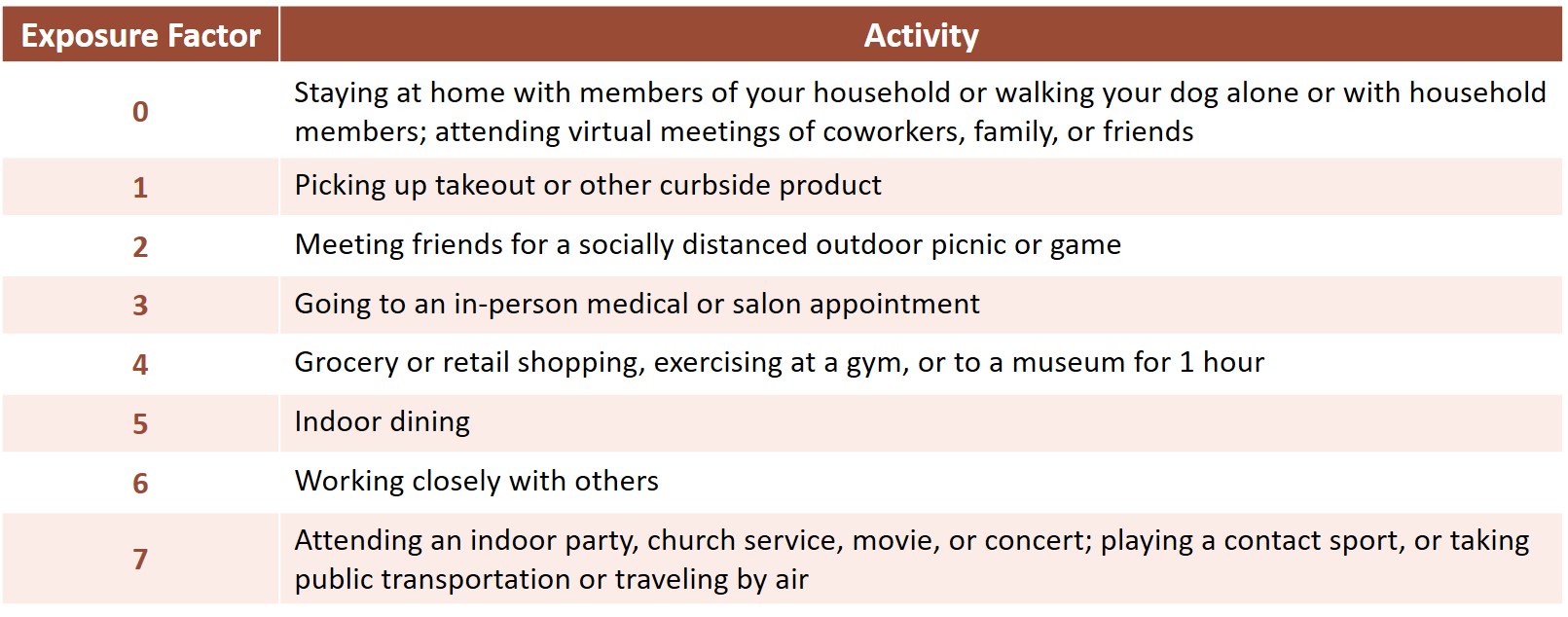Budgeting Exposure
Whether you’re managing your household budget, balancing your diet, or deciding how to spend your time, there are always risks and benefits. Getting a pricey dinner out every week might limit funds for a vacation later on. The thought of indulging in a slice of homemade strawberry rhubarb pie might prompt you to eat a lighter dinner.
Like Vermont’s Commissioner of Health Dr. Mark Levine, I would like to encourage everyone to think of their exposure to COVID-19 in the same way. We could be living with the risk of exposure to COVID-19 for a long while yet. We can’t always avoid situations that may lead to a COVID exposure, but we can balance our activities to reduce our risks. I would like to illustrate how to set a COVID-19 exposure budget that makes sense for you and your family.
The three main attributes that make situations risky are (1) lots of people (2) spending lots of time together (3) in enclosed spaces.
Let’s call situations that include none of these risky attributes “zero risk.” These might include staying at home with members of your household or walking your dog alone or with household members. Imagine we assign one point to situations where you meet someone outside your household outdoors for a short time, like picking up takeout. Meeting friends for a socially distanced outdoor picnic or game would be worth two points. See the chart below. If you don’t see an activity listed, use your own judgement to assign it an exposure factor.

Wearing masks reduces risks, and not wearing them increases it. If you do any of the activities in categories 1 – 7 without a mask on, add three points to the exposure factor!
So imagine that, in a typical week, a single person—consistently wearing a mask—engages in the following behaviors. She picks up take out (1 point), visits friends outside (2 points), grocery shops (4 points), and goes to the gym three times (total of 12 points). She would have an exposure budget of 19. If she knows a work situation will bring her in close contact with her coworkers (6 points), she may decide to exercise at home during that week, which would bring her exposure to 11, rather than 25.
While it may be unfair, households need a single exposure budget. Because you likely encounter your fellow housemates in situations where avoiding exposure would be difficult, like at mealtimes, for instance, if one of you gets COVID, it is likely that all will.
Balance your exposure accordingly. If one family member has a job that involves one or more of the attributes that increase exposure, listed above, both that person and the rest of the family should try to dial down their exposure to compensate.
Similarly, if any member of the household is at higher risk for a serious case of COVID-19, the exposure budget should be less as well. People who are over 60 and those with diabetes, obesity, chronic kidney disease, or sickle cell disease should be especially careful. While it is still uncertain if pregnant women are at greater risk, it would be wise for them to set a lower exposure budget as well.
Now is a great time to calculate your own exposure. Is it higher than you would like or about right? How would you offset having to enter a risky situation with cuts in exposure elsewhere? We could be living in a world with an increased risk of developing COVID-19 for a year or more. Doing this work now will help protect you, those in your household, and all of society from developing this dangerous illness.
Marie George, MD, is the infectious disease specialists at SVMC Infectious Disease.
6537